
Murray Leinster was a pen name of William Fitzgerald Jenkins, an American writer of genre fiction, particularly of science fiction. He wrote and published more than 1,500 short stories and articles, 14 movie scripts, and hundreds of radio scripts and television plays.
A future history is a fictional conjecture of the future used by authors of science fiction and other speculative fiction to construct a common background for stories. Sometimes the author publishes a timeline of events in the history, while other times the reader can reconstruct the order of the stories from information provided. The term can also be used to describe the subgenre of science fiction that uses this framework.
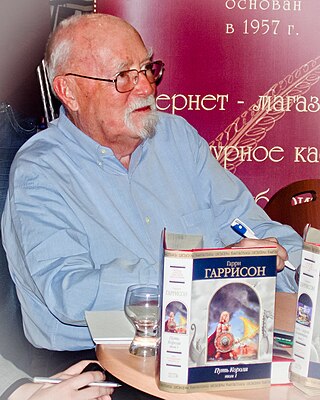
Harry Max Harrison was an American science fiction author, known mostly for his character The Stainless Steel Rat and for his novel Make Room! Make Room! (1966). The latter was the rough basis for the motion picture Soylent Green (1973). Long resident in both Ireland and the United Kingdom, Harrison was involved in the foundation of the Irish Science Fiction Association, and was, with Brian Aldiss, co-president of the Birmingham Science Fiction Group.

John Keith Laumer was an American science fiction author. Prior to becoming a full-time writer, he was an officer in the United States Air Force and a diplomat in the United States Foreign Service. His older brother March Laumer was also a writer, known for his adult reinterpretations of the Land of Oz. Frank Laumer, their youngest brother, is a historian and writer.
Arthur Bertram Chandler was an Anglo-Australian merchant marine officer, sailing the world in everything from tramp steamers to troop ships, but who later turned his hand to a second career as a prolific author of pulp science fiction. He also wrote under the pseudonyms of George Whitley, Andrew Dunstan and S.H.M. Many of his short stories draw on his extensive sailing background. In 1956, he emigrated to Australia and became an Australian citizen. By 1958 he was an officer on the Sydney–Hobart route. Chandler commanded various ships in the Australian and New Zealand merchant navies, including his service as the last master of the Australian aircraft carrier HMAS Melbourne; by law, the ship was required to have an officer on board while awaiting its towing to China to be broken up. Chandler wrote over 40 novels and 200 works of short fiction, winning the Australian Ditmar Awards for the short story "The Bitter Pill" and for three novels: False Fatherland, The Bitter Pill, and The Big Black Mark. One of Chandler's daughters, Jenny Chandler, married British horror fiction writer Ramsey Campbell. His other children were Penelope Anne Chandler and Christopher John Chandler.
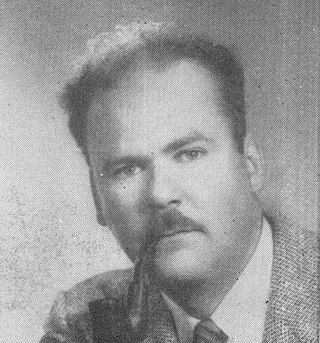
Dallas McCord "Mack" Reynolds was an American science fiction writer. His pen names included Dallas Ross, Mark Mallory, Clark Collins, Dallas Rose, Guy McCord, Maxine Reynolds, Bob Belmont, and Todd Harding. His work focused on socioeconomic speculation, usually expressed in thought-provoking explorations of utopian societies from a radical, sometime satiric perspective. He was a popular author from the 1950s to the 1970s, especially with readers of science fiction and fantasy magazines.

A megastructure is a very large artificial object, although the limits of precisely how large vary considerably. Some apply the term to any especially large or tall building. Some sources define a megastructure as an enormous self-supporting artificial construct. The products of megascale engineering or astroengineering are megastructures.

James Henry Schmitz was a German-American science fiction writer.

Jame Retief is the main character in a series of satirical science fiction stories by Keith Laumer. The stories were written over a span of thirty years beginning in the early 1960s, without much regard for chronology or any particular scheme.

Deathworld is the name of a series of science fiction novels by American writer Harry Harrison, including the books Deathworld, Deathworld 2 and Deathworld 3, plus the short story "The Mothballed Spaceship". The central hero is a gambler who becomes involved with colonists of an extremely hostile planet.
Stephen Charles Goldin is an American science fiction and fantasy author.
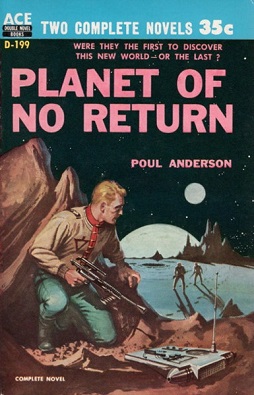
Question and Answer is a science fiction novel by American writer Poul Anderson. It originally appeared in the June and July 1954 issues of magazine Astounding Science Fiction, and was later reprinted in 1956 as part of Ace Double D-199 under the title Planet of No Return, and again as a stand-alone Ace novel in February 1978 under the original title.
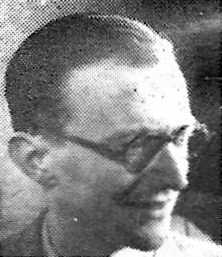
James Murdoch MacGregor was a Scottish journalist and author best known for writing science fiction under the pen name J.T. McIntosh.

The Psychotechnic League is a future history created by American science fiction writer Poul Anderson. The name "Psychotechnic League" was invented by Sandra Miesel during the early 1980s, to capitalize on Anderson's better-known Polesotechnic League future history. Anderson published 21 novels, novellas and short stories set in this future between 1949 and 1957, with a 22nd published in 1968.
"Entity" is a science fiction short story by American writers Poul Anderson and John Gergen, which appeared in the June 1949 issue of Astounding Science Fiction. "Entity" was the fifth story published by Anderson, and the only story published by Gergen, a friend of him from the Minneapolis Fantasy Society.

Sargasso of Space is a science fiction novel by American writer Andre Norton, written under the alternate pseudonym "Andrew North". It was published in 1955 by Gnome Press in an edition of 4,000 copies.

Space Pirate Mito, also known as Stellar Buster Mito in Japanese, is an anime series from 1999. It was produced in two seasons at 13 episodes each. Directed by Takashi Watanabe, the series was animated by Triangle Staff. Furthermore, there was a theatrical production of the series, during the year 2000.
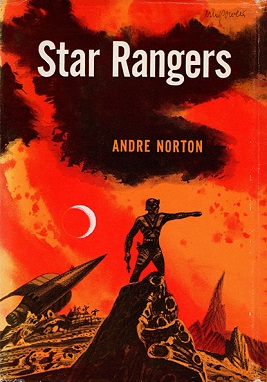
Star Rangers, also known as The Last Planet, is a science fiction novel by the American author Andre Norton. The novel was published on August 20, 1953, by Harcourt, Brace & Company. This is one of Norton's Central Control books, which lay out the history of a galactic empire through events suggested by Norton's understanding of Terran history.
This is complete list of works by American science fiction and fantasy author Fred Saberhagen.














